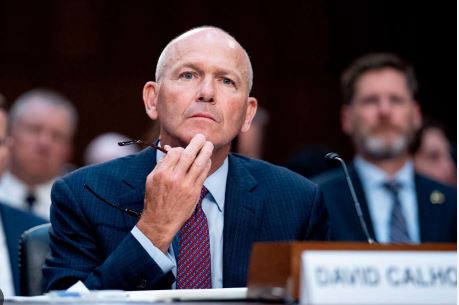Senate Panel Criticizes Boeing CEO: ‘It’s Inexcusable That You Remain in Your Position

Boeing Faces Scrutiny Over Safety Practices and Whistleblower Allegations
Boeing CEO Dave Calhoun faced intense questioning from a Senate panel regarding the aerospace company’s safety standards and handling of whistleblower claims. The scrutiny centered on allegations of quality lapses, whistleblower complaints about compromised parts, and concerns over retaliation against employees.
Calhoun, who announced plans to step down by the end of the year, defended Boeing’s efforts to enhance manufacturing quality and rebuild its safety reputation following incidents like the midair door-panel blowout on an Alaska Airlines flight earlier in the year. Despite ongoing efforts, the company has yet to name Calhoun’s successor after he took over in the aftermath of previous leadership changes prompted by fatal Boeing crashes.
During the Senate subcommittee hearing, whistleblower Sam Mohawk, a quality-assurance investigator at Boeing, presented troubling claims. He alleged that damaged or substandard parts were inadequately tracked and possibly installed on airplanes at Boeing’s Renton, Washington, facility where the popular 737 Max is manufactured. Mohawk further stated that supervisors instructed him to conceal evidence from the Federal Aviation Administration (FAA) and retaliated against him for raising concerns.
According to documents released by the subcommittee, Mohawk reported instances where critical airplane parts were stored improperly during FAA inspections, including rudders, winglets, and stabilizers.
In response to the allegations, Boeing issued a warning to Mohawk, accusing him of disruptive behavior. The company stated it is reviewing the claims and emphasized its commitment to encouraging employees to report safety concerns.
The unfolding situation underscores ongoing challenges within Boeing’s corporate culture and regulatory compliance efforts. As the investigation continues, Boeing faces pressure to address these issues transparently and ensure the highest standards of safety and quality in its aircraft production.
Boeing Faces Heightened Scrutiny Amid Whistleblower Allegations and Potential Legal Challenges
Boeing continues to navigate turbulent waters as it confronts fresh allegations of safety lapses and whistleblower claims, which have intensified scrutiny from regulatory authorities and lawmakers alike.
The Federal Aviation Administration (FAA) disclosed an uptick in reports from Boeing employees following a midair door-plug blowout incident in January. While the FAA pledged thorough investigations into these reports, it refrained from commenting on specific allegations highlighted during recent Senate hearings.
Notably absent from the Senate subcommittee’s hearing was whistleblower Sam Mohawk, whose revelations have added to Boeing’s mounting challenges. Mohawk, a quality-assurance investigator at Boeing, raised concerns about compromised parts and alleged instructions from supervisors to withhold information from the FAA.
The latest developments come amidst looming legal repercussions for Boeing. The Justice Department recently indicated potential prosecution, asserting that Boeing violated terms of a 2021 settlement related to the 737 Max crashes in 2018 and 2019, which claimed 346 lives. The crashes implicated a flight-control system on the Max, prompting regulatory and public scrutiny.
Family members of crash victims attended the Senate hearing, underscoring the emotional toll and demand for accountability. Sen. Richard Blumenthal, chair of the subcommittee, expressed dissatisfaction with Boeing’s responses and urged the company to take responsibility for its actions.
Calhoun, Boeing’s CEO, acknowledged the gravity of the situation and apologized to the victims’ families at the hearing. He emphasized Boeing’s commitment to safety and expressed a desire for the company to succeed despite ongoing challenges.
As Boeing navigates these complex issues, stakeholders continue to monitor developments closely, emphasizing the importance of transparency, regulatory compliance, and safety in aerospace manufacturing.
Boeing Faces Scrutiny Over Quality Control and Production Challenges
Boeing is actively addressing quality flaws in its aircraft production processes and striving to minimize “traveled work,” where steps are completed out of sequence to rectify defects. These efforts come in response to concerns raised by whistleblowers regarding quality issues and allegations of retaliation within its factories.
CEO Dave Calhoun defended Boeing’s approach to handling whistleblowers during recent Senate hearings, noting that some employees have been terminated for retaliatory actions. However, he refrained from disclosing specific names to respect their privacy.
Senator Josh Hawley criticized Boeing’s management, accusing them of cutting corners and highlighted Calhoun’s compensation package, which rose to nearly $33 million last year, up 45% from 2022. Hawley expressed strong disapproval, describing it as a “travesty” that Calhoun remains in his position.
Amidst regulatory pressure, the FAA has maintained stringent oversight of Boeing’s operations, keeping inspectors on-site until satisfied with safety improvements. This scrutiny has resulted in a halt to Boeing’s production rate increases for the 737 Max, affecting delivery schedules for major customers like Southwest Airlines and United Airlines.
Boeing’s financial outlook has been impacted by these challenges, with lower production rates leading to cash flow concerns. The company anticipates using approximately $8 billion in cash during the first half of the year, warning investors of a negative cash flow for the year.
The aerospace giant also faces supply chain issues, highlighted by Spirit AeroSystems’ recent disclosure of titanium entering the supply chain with falsified documents. Despite this, rigorous testing confirmed the material’s suitability for aircraft use.
Looking ahead, Boeing is navigating complexities surrounding its proposed acquisition of fuselage supplier Spirit AeroSystems, with Calhoun indicating optimism for finalizing the deal by mid-year, though specific timelines remain uncertain.
As Boeing continues to address these multifaceted challenges, stakeholders closely monitor developments, underscoring the company’s commitment to safety, quality, and operational integrity in aerospace manufacturing.
